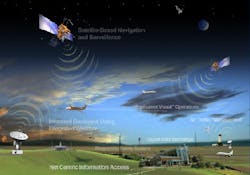The following information was released by the Aircraft Owners and Pilots Association:
By Dan Namowitz
As the FAA begins to detail plans to take the National Airspace System from ground-based navigation systems to satellite technology, the agency has committed to creating an advisory group urged by AOPA and others to help set key guidelines for the transition.
In January, AOPA reported that the FAA is planning a 50-percent reduction in the existing VOR network as part of the transition to a National Airspace System based on satellite technology. The plan relies on GPS as the primary navigation system, consistent with other NextGen requirements including the Automatic Dependent Surveillance-Broadcast (ADS-B) Out mandate. During the transition, the FAA will retain a minimum operating network (MON) of VORs to mitigate the impact of a GPS outage. Membership surveys indicated that GPS has become the navigation system of choice for 78 percent of AOPA pilots.
The FAA said it had accepted the recommendation to set up the advisory group in published responses to stakeholder comments on its proposed provision of navigation services. In December 2011 the FAA invited comments on its plans to transition from ground-based navaids to satellite-based navigationin particular the details of its planned technological departure from VOR and other legacy navigation aids.
The advisory group will make recommendations on criteria to be used to complete the details of VOR discontinuance. The FAA has not targeted specific VORs to be discontinued, nor set up a timeline for shutdowns. It also has yet to create a list of the navaids that will make up a minimum operational network that will continue as a backup service to ensure navigation capabilities for IFR flights in the event of GPS outages. While the VORs retained in the MON will support VFR aircraft operations, their purpose is clearly to support those aircraft operating under IFR, the FAA said.
Copyright 2012 States News Service


